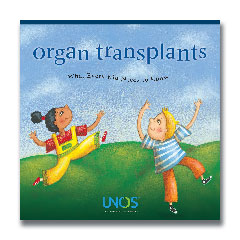The job of a transplanted child’s parent can be especially challenging. Although parents are often surprised at the complexity of post-transplant management, their efforts and sacrifices contribute greatly to children reaching the goals of a successful transplant.
- Medication management
- Infection precautions
- Energy & physical activity
- Growth & development
- Appetite & nutrition
- Social readjustment
- Sun exposure
- Pets
- Travel
Medication management
A child who has undergone a transplant will have regular doctor visits, blood tests and medicine changes to prevent rejection, infection and other side effects. Parents should be as informed and prepared as possible about what to expect, including:
- understanding that there may be many different types of medications that need to be taken more than once a day
- realizing that managing medication is stressful and may create conflicts with your child
- becoming familiar with the names of the medications, the reason for their use and how they are given
- tell the transplant team if any of the medications bother the child so they can plan the best combination of medicines
- providing age-appropriate support and supervision to assure that medications are taken as prescribed
The following tips may be helpful when handling medications for your child:
- Develop a system that is easy to follow
- Make sure you have enough medication at home and get prescriptions filled early so you don’t run out
- If your child misses a dose of any of the medications, for any reason, notify the transplant team coordinator or your transplant physician
- Because many medicines interact with transplant medicines and may increase side effects or make the transplant medicine weaker so the child is at greater risk of rejection, never give your child new medications until you discuss it with your transplant team
Infection precautions
Due to your child’s decreased ability to fight infection post-transplant, a greater awareness about exposure to infections is important. Read more about infections and your immunity now >
Energy level and physical activity
The most dramatic change that occurs to a child after a transplant is an overall improvement in how they feel. After a transplant, your child will be able to gradually increase physical activity to a level similar to their peers.
In fact, energy and activity can improve so dramatically that parents often express concern about that their child has become hyperactive or participates in aggressive play that may seem too rough. Parents need to be prepared to set reasonable limits on their child’s play. Because this task may be difficult, pre-operative discussions about physical activity limitations with the transplant team and your child may be helpful.
Physical therapy may also begin while your child is in the hospital. A physical therapist will work together with you and your child to develop a program that integrates your child’s needs, goals and activity preferences, and help them attain the usual developmental milestones.
Growth and development
As a routine part of ongoing follow-up care, your child will also undergo regular assessments to check their physical growth, as well as emotional and social functioning. Many children will have marked improvement in motor and cognitive skills, school performance and play skills. Depending on a child’s age, parents can help in a variety of ways.
Appetite and nutrition
As a part of feeling well, a transplanted child’s appetite will improve dramatically. This change can be very confusing to the children and their parents unless clearly discussed prior to transplantation.
In addition, because immunosuppressant medications may cause weight gain, salt retention, potassium loss, high blood sugar and high blood pressure, it is often helpful to work with a nutritionist to design an appropriate diet plan for your child. Talk to your doctor about your child’s specific needs. Read more about the important role of diet and exercise now >
Social readjustment
Social readjustment can be a major issue for a child following transplantation. Every effort should be made by both the parents and the transplant team to identify if a child is having problems coping with their changes and fears following transplantation:
- Parents and doctors need to reassure the child that physical changes will improve with time
- Parents can help their child manage these differences by planning ahead with the school
- Parents should emphasize the child’s good physical attributes
- Parents should stress that the long-term outcome of many of the physical changes will be minimal
Daily living
- Focus on the joys and accomplishments of today
- Join a support group or form a relationship with a family facing a similar situation
- Research and ask questions to learn all you can about your child’s condition and potential therapies
- Be easy on yourself when you’ve had a bad day
- Learn about your child’s special financial and educational needs
- Don’t be afraid to ask for help
- Schedule and spend special time with your spouse and other children
Exposure to sun
Because sensitivity to the sun is one of the more common side effects associated with some immunosuppressants, it is important to protect your child from exposure to the sun. Sunscreen, hats and shirts should be used when outside for any period of time in the sun.
Pets
It is important that you discuss plans for new pets with your transplant team. In addition, due to the higher risk of infection, it is not recommended for your child to be cleaning pet cages or changing litter boxes.
Travel
Due to complex follow-up care, it is important that your family not make any travel plans for the first three to six months after the transplant.
Reference and Publication Information
This Web site is intended solely for the purpose of electronically providing the public with general health-related information and convenient access to the data resources. UNOS is not affiliated with any one product nor does UNOS assume responsibility for any error, omissions or other discrepancies.

